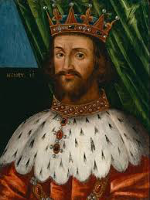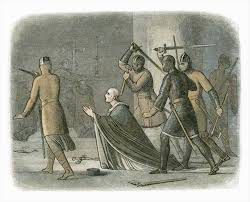King Henry II of England
Henry inherited an England that had been wracked by fighting and treachery and a treasury that was relatively devoid of riches. Henry, who was just 21 when he assumed the throne, set about restoring order. 
He started by reclaiming for England lands that the Scottish and Welsh had settled into during their struggle with Stephen. He followed that up with the demolition of a number of castles that been built illegally during The Anarchy. He established a system for reforming the justice system, including introducing some concepts that seem very familiar to modern minds, like trial by jury. He then sought out the advice of England's most powerful barons and then followed it, gaining him their support. The result was again a united England. He also relied strongly on his mother for counsel, for many years. He was a physically strong man who had a powerful personality, with a tremendous propensity for energy and ingenuity and an almost equal capacity for quick rage. He loved the outdoors, particularly hunting, and he was rarely seen out of the saddle. He won many battles through a combination of quick thinking and decisive action. When he wasn't fighting or hunting, he enjoyed reading and debating the issues of the day with his advisers. Early in his reign, Henry counted heavily on two men who would be important parts of Henry's story. One was Theobald, Archbishop of Canterbury. The country's highest religious official, Theobald had been Henry I's righthand man. Henry II named Theobald his chief counselor. As his chancellor, or chief minister, Henry named Theobald's young secretary, Thomas Becket. Both men proved to be able administrators; Thomas proved especially adept at securing Henry's reign and paving the way for new support and new revenues. Henry couldn't resist trying to take more land across the English Channel, leading forces into two other territories, Brittany and Toulouse. In 1161, Henry and King Louis of France went to war. The fighting was fierce, even after the two monarchs had tried to end it by pledging a marriage between Louis' daughter and Henry's son (Young) Henry, and Henry seized a large amount of new land, including the city of Blois, which he claimed relatively quickly and easily despite its vast fortifications. An intervention by the pope brought the two monarchs to the negotiating table, and the fighting stopped. One of the ways that Henry established to pay for his wars in France was a practice known as scutage: a baron could, instead of taking up arms himself, pay the king a sum of money instead. The king could then use that money to pay someone else to do the fighting; and because those mercenaries were getting their money from the king, they would pledge their loyalty to the king (which was not always the case if barons or other nobles agreed to fight in the king's name). Scutage was also known as "shield money." Henry and Eleanor had eight children:
Theobald died in 1162, and Henry named Becket his successor. Henry and Becket had, up to this time, been of like minds about the necessities of rule and the way that the monarchy and the church interacted. When Henry named Becket Archbishop of Canterbury, something in Becket changed. He believed that he, not Henry, was the head of the Church. The two men began to disagree, sometimes heatedly. Becket wanted to keep that power in the hands of the church. Henry wanted the king to have more power over the church, and he thought that Becket agreed. Becket did not. In 1164, Henry proposed a new set of rules, the Constitutions of Claredon, which set out what he defined as the ancient customs of the realm. Like his great-grandfather William the Conqueror before him, he set about trying to roll back the set of events that directly preceded his ascension to the throne. In this case, he wanted to return the country–particularly its appreciation of the monarchy–to the understanding that had been in place when his grandfather, King Henry I, had been on the throne. The net effect of this, as far as Becket was concerned, was a limiting of the church's jurisdiction over crimes committed by clergymen. In 1166, through the Assize of Clarendon, Henry had stopped the practice of accused people being tried by church courts, replacing it with trial by jury. Becket found an ally in Pope Alexander III, who refused to recognize Henry's Constitutions of Clarendon; Becket, too, refused to adhere to them. Matters came to a head finally when Henry wanted to punish church officials after the church had already punished them; Becket disavowed Henry's authority to punish members of the clergy. Henry threatened violence, and Becket fled to France. Turning to succession, Henry had his oldest son, also named Henry and referred to as Young Henry, crowned as his heir and successor. The honor of coronation of an heir was properly within the purview of the Archbishop of Canterbury, but Becket was absent and Henry went ahead without him; instead, the Archbishop of York performed the duties. The pope, to whom Becket had fled once he left England, threatened to remove from office the bishops who had crowned Henry. Henry sought to defuse the situation by meeting with Becket and the pope in France. The result was an open invitation for Becket to return to Canterbury in peace.  Becket went home and promptly excommunicated the bishops who had helped in the coronation. When Henry, still in France, heard of this, he flew into a rage and wished for some final end to the situation. Many historians quote Henry as saying something along the lines of, "Will no one rid me of this turbulent priest?" Four knights loyal to the king sailed for England, found Becket in his own cathedral, and killed him, on Dec. 29, 1170. Henry was devastated by the act and spent three years in mourning, after which he entered the cathedral that was the site of the murder, knelt barefoot before Becket's tomb, and endured a beating from the priests who had gathered there. Henry invaded Ireland in 1171 and succeeded in gaining the homage of the high king, Rory O'Connor. Henry set about having castles built to solidify his hold on Ireland. This increased the land held by Henry to a very large amount. The relationship between Henry and Eleanor had by this time deteriorated. Former allies, they had disagreed on matters of policy recently. Eleanor was also angry about relationships that Henry had with other women. Young Henry, Richard, and Geoffrey rose up in rebellion against their father in 1173 because of Henry's announced intention to divide his lands among three of his sons (England and Normandy for Young Henry, Aquitaine for Richard, Brittany for Geoffrey, and nothing for John), not leave everything to his heir; joining them were Eleanor, King Louis of France, and King William the Lion of Scotland. As he had done against earlier enemies, Henry was eventually victorious, defeating his sons' claims. (John had not revolted.) The Great Revolt, as it was known, ended with peace talks in 1174. Significantly, Henry punished Eleanor by having her imprisoned for several years. The peace lasted for a time, but tensions resumed and open war broke out again in 1182, this time in Aquitaine. As before, King Henry defeated all challenges. Young Henry and Geoffrey died not long after this series of events, leaving Richard and John as possible heirs. Richard demanded that his father name him his successor, but Henry refused (having awhile ago declared John his favorite to succeed him but not making an official declaration). The fighting continued, and Henry suffered a rare defeat. By this time in poor health, Henry went to Anjou and, at a meeting with Richard and the new French king, Philip II, surrendered. He later found out that John had turned against him as well. Heartbroken, he died on July 6, 1189 at Chinon and was buried in Fontevraud Abbey. Richard, as the oldest surviving son, became king and inherited the vast Angevin Empire. Henry was known by a handful of other names in his lifetime:
First page > Early Years > Page 1 2 |
|




